 Big changes are coming to the SAT. International students debuted the adaptive, digital version of the exam in March 2023. U.S. students will make the conversion from pen and paper to this new digital exam in March 2024. This overhaul will have significant implications for Class of '25 students. Here, we outline some of the key changes and important considerations for the Class of '25. 4 Key Changes 1. Digital. Instead of taking the exam with pencils and paper, you'll now use College Board's new testing app, Bluebook. With features like annotations, answer-elimination, countdown clock, and mark for review (flag questions that you wish to revisit), the app has several tools that should help ease this transition. But there is no way around it: this will be a very different experience. 2. Adaptive. Your performance on the baseline sections of the Reading/Writing and Math will determine whether you proceed to the easier or more challenging adaptive sections. For example, the baseline Reading/Writing will consist of 27 questions and the Math section will consist of 22 questions. You'll need to get more than "x" number of questions correct in order to be directed towards the harder section in each. That "x" value might be 19 for Reading and 14 for Math (or something close to those numbers). The exact threshold is just an estimate in order to give you some sense of what this will look like. So why does this matter? Your performance on the baseline will determine how high or low you can ultimately score. For example, according to our colleagues at Applerouth, a student who makes it into the harder math section but then proceeds to get everything wrong might score no lower than 500. A student who does not make it into the harder math section but then proceeds to get everything right might max out at a 650. Again, these numbers are approximations. But you see why making it into the harder adaptive section matters! 3. Shorter. The new SAT is just over 2 hours, which should be a welcome change from the current 3+ hour version. 4. Different Emphasis. The new test will look significantly different... • The Reading section says farewell to the 80-90 line passages that were accompanied by sets of 10-11 questions. Instead, passages are now short and accompanied by a single question. In addition, they are now grouped by type (i.e. Vocab-in-Context, question type 1.6 in the Peak method) rather than randomly. The implications are significant: working memory and annotations become less important than analysis of the text and recognition of author's tone. In addition, vocabulary take on a more important role. This isn't the type of vocabulary that existed back in the 80s, 90s, and early 00s. Rather, we are talking about "functional vocabulary" and "contextual use of words." • The Writing section is now fully integrated into the Reading, so for the first time this truly is a Reading/Writing section (in the current version, Reading and Writing contribute to one score but are separated into two distinct sections). Writing questions, which in the past were 60% about grammar and 40% about rhetorical decisions, might wind up skewing slightly more towards the rhetorical decisions. Logical transitions (question type 2.2 in the Peak method) take on heightened prominence in some of the already released digital versions. • The new version of Math will feature only 44 questions (down from 58 on the current version). In addition, the math questions have become less wordy, which should be a welcome change for students who prefer the more straightforward ACT math questions. While you can still use your graphing calculator, you will now have an on-screen graphing calculator as well. And to the delight of most students, you will be able to use that calculator on all 44 math questions. Good riddance to the "No Calculator" math section! Content coverage doesn't seem to be all that different, with Algebra and Advanced Math continuing to lead the way, Problem Solving (percentages, probability, data charts) slightly less important, and Geometry/Trigonometry becoming more important but still a fairly minor part of the overall equation (particularly compared to the ACT). Important Considerations So, you are a Class of '25 student or parent, have just read this, and are now thinking, "What does this mean for me?" The answer might range from "nothing at all" to "possibly something" to "definitely something." Nothing at All. If you decide to take the ACT, then these changes do not affect you. Or, if you decide to take the SAT and are done with your official testing by December of your junior year, you'll never need to encounter the digital SAT. Possibly Something. If you decide to take the SAT and begin your official testing in the fall, then it's entirely possible that you may need to take the March 2024 exam. If this is the case, you will make the transition from the paper and pencil version after the December 2023 exam. As you've read above, this will involve a fairly significant transition--in terms of format, medium, and content. It's certainly doable, but we don't think many students will be eager to be the "test dummies" in this scenario. Definitely Something. If your plan is to target the December SAT as your first official exam, then it's highly likely that you will set yourself up to take two different versions of the SAT. While in past years Peak Performance encouraged students to start preparing over the summer prior to their junior year in order to target the December and March exams, that plan no longer seems so wise for SAT students. It might be better to either target earlier official exams or embrace the new version and aim for one or more of the March-May-June-August (2024) options. Conclusion Regardless of anything above, your first steps remain the same: take a full-length ACT diagnostic and a full-length SAT diagnostic. A student taking an SAT diagnostic prior to September 1 may still want to use the current SAT, while a student taking an SAT diagnostic after September 1 might be better off going right to the digital version and forgoing the current version of the exam. Let the data, your own reflections on the diagnostic experience, and the information above inform your decision. We look forward to mentoring you through this process!
0 Comments
If exam day is approaching faster than you expected, don’t panic! Here is a timeline with strategies and everything you need to know regarding the days leading up to the SAT or ACT Exam and exam day itself!  The Week Before/ the Days Leading Up The SAT and ACT each take place on a Saturday morning, but the actions you take the week before can have a significant impact on your performance. Most likely, you will have already studied for weeks, maybe even months, so you will not need to do that much content-based preparation in the days leading up to the exam. One of my tips is to make sure you sleep enough in the days leading up to the exam. When I took the November SAT (my first test), I barely slept the week before, since I had been busy with schoolwork. Although I went to bed early the night before, I still felt groggy from all of my sleep debt from the previous nights. Even with a busy schedule, do your best to finish your schoolwork and go to sleep at a reasonable time in the days leading up to the exam. The Night Before I struggled to listen to this advice myself, but trust me, on the night before, do not spend time studying! If you feel that not studying is impossible, maybe do one passage from each section and a few math questions just to keep the material fresh. Chances are you have been studying for a significant amount of time, and cramming will not help you in any way. Also, I would make sure to locate all of the items that you will need beforehand--number 2 pencils, calculators, a silent watch with a “chrono” feature, your admissions ticket, your photo ID, and anything else you think you might need. Put all of the items neatly in a bag--this way, when you wake up in the morning, you will have one less thing to worry about. Once you have organized all of your items for the next day, relax! Trying to do questions or learn new vocabulary the night before will stress you out unnecessarily, so instead, go for a walk or go out to dinner with friends! The Morning Of On the morning of the exam, I would recommend waking up early to allow yourself enough time to get ready, especially if the testing center is far away. For me, the earlier I wake up, the more awake I feel around 8 o’clock. Although you will be nervous and your stomach will most likely hurt, try to have a nutritious breakfast with protein because the test will last for a few hours, and you will need energy. I would recommend leaving yourself enough time and arriving at the school a little early--between 7:30 and 7:45. When you arrive, people will most likely be huddled around the entrance panicking, but take a deep breath and relax. Don’t let the masses of people stress you out--you have studied and prepared to your best ability! Have your ticket and photo ID ready to show as you will need to present them to enter the school. Once the security guards let you in, there will be a wall with names and room assignments and people to give directions if you are unfamiliar with the school.  Test Day Before the exam begins, the proctors will read the instructions, and you will need to bubble in your name, birthday, and other pieces of information. Some proctors will adhere strictly to the script, while others will gloss over certain sections. Regardless, you will probably not begin the actual test until after 8:30 by the time everyone else finishes bubbling in all the questions. When the exam finally starts, the most important thing is not to panic. If you become too nervous, the strategies that you have learned will begin to slip away. When I took the November SAT, the moment that time started, I panicked--I skimmed over the passages, and then I nearly ran out of time because I did not have a thorough understanding of anything I read. Had I slowed down and taken more time (while still moving quickly), I probably would have performed better. Once you finish the first two sections of the SAT or ACT, you will have a break at the halfway point. I suggest walking around and getting your blood flowing since you will still have two more sections--two down, two to go. Finally, once you finish the last two sections (a pair of Math sections for the SAT; Reading and Science for the ACT) you will probably leave around 12:30, and you should expect to find out your score in the next few weeks. Retaking the Test Depending on how you score on the exam, you might want to retake the test. When the College Board or ACT sends the score reports, you will have access to a breakdown to see the types of questions you performed well on and the types of questions you struggled on. This information is not as detailed as the Peak item analyses you’ve been receiving, but it’s still helpful. Although you may feel uncomfortable addressing your errors, tailor your studying to focus on your weaknesses so that you can perform better on those sections on the next test. On test day the second time around, you will probably feel more confident because you have already taken the exam once and have experience--or at least I did. When I sat for the December SAT, I took a deep breath before beginning the Reading section and took each passage slowly, and I avoided many of the mistakes that I made the last time on the November SAT. (My score on the Evidence-Based Reading and Writing improved by 90 points.) Once you have one test under your belt, you will recognize the mistakes you made and should be able to avoid repeating them. Final Thoughts Test day can appear overwhelming, but as long as you prepare in advance and have everything you need set out before, you can minimize the stress! Remember that you have studied, and stick to your strategies to the best of your abilities, even though you may feel pressure while taking the exam. Finally, even if you don’t do as well as you would have hoped, you will have the chance to retake the exam and the opportunity to learn from your mistakes--in order to be successful, remember to take control of the process and hone in on your weaknesses so that you can improve your score. 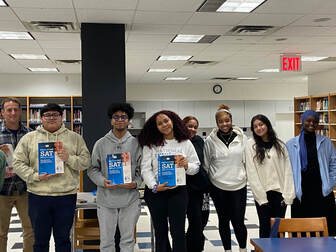 Peak Performance is back in the Bronx for Year 5 of our College Pathways Program! This year's group includes 13 students who attend nine different high schools throughout New York City. One month into the 2023 program, lead instructor Jared Small is thrilled with the students' commitment, energy, and consistency: "After a long week of school, not many students are super excited to spend Friday evenings hitting the books, and I'm so thankful that this group has embraced this process." For Aaleeah Matos (Dominican Academy '24), the most important priorities are to "improve pacing and get more comfortable with math skills and strategies." Citing UConn and Columbia as among her dream colleges, Aaleah brings a willingness to participate every Friday! Cristian Lopez (All Hallows '24) and Angelique Campos (Cathedral HS '24) both seek to get enough practice to maximize their potential on the upcoming official SAT exams. Cristian is an avid chess player and manga reader, and his enthusiasm for class is palpable. Angelique follows in the footsteps of her older brother, who participated in Peak's College Pathways program two years ago. An accomplished dancer and student leader, Angelique has fantastic active reading skills that help her perform particularly well on the Reading section. Angelique's high school classmate Judith Amoah (Cathedral HS '24) is also a vibrant member of this year's class. Her list of dream colleges includes a range of sizes and locations. Judith is particularly interested in the potential to pursue a writing career at Kenyon College. Among Judith's many amazing qualities as a student is her willingness to contribute answers, share her thoughts, and take intellectual risks in order to strengthen her skills. What's in store for Aaleeah, Cristian, Angelique, Judith, and the rest of this group? Foremost, the students will focus on mastering the SAT and getting ready to take their first or second official SAT later this year. Over the course of the next several months, Jared will continue to meet with the students on Friday evenings in Hunts Point to dissect the 'ins' and 'outs' of the SAT. A couple timed practice exams will also help monitor progress and inform instruction. Check back in for updates of our journey together! 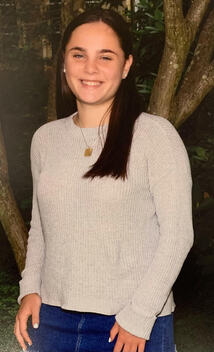 Blog Post by Elizabeth Fink, 2021 Peak Intern Elizabeth Fink was the valedictorian of her high school’s senior class. She earned a 1600 on the SAT and currently attends the University of Virginia as an Echols Scholar. She has not declared a major yet, but is planning to apply to the Mcintire School of Commerce as a second year. Outside of the classroom, she plays soccer and runs track, and she loves to spend time with her friends and family. Elizabeth also served as a mentor/tutor to elementary school children as part of the PeakMATES program. SEVEN FACTORS TO DECIDING BETWEEN THE SAT AND ACT As a result of the COVID-19 pandemic, many colleges decided to go test-optional for the 2020-2021 admissions cycle due to the limited availability of testing and other hardships. Some schools, including the Eight Ivies, extended test-optional policies to the ensuing admissions cycles, while others have decided to permanently extend test-optional policies. You might be wondering: is taking the SAT or ACT valuable anymore? The answer is still yes: taking the SAT or ACT can be highly valuable. If you perform well on the SAT or ACT, your score can help distinguish you from other highly qualified candidates from different backgrounds. Especially as more and more students decide not to submit test scores, scoring well on either exam will allow you to stand out. The question now becomes: should you take the SAT or the ACT? One of the first steps I would recommend is to take a proctored SAT Exam and a proctored ACT exam in two separate sittings without studying in advance. Sitting for both may seem daunting and time-consuming but will take less time than trying to take a shortcut. I took a combined SAT and ACT exam through Kaplan at first to try and save time, but I ended up needing to take a full-length official SAT and ACT afterward. Peak Performance offers free, proctored diagnostic tests for both the SAT and ACT. Once you finish, your scores and the item analyses can help determine which test you should take. In addition to experiencing a practice test, here are six key differences between the SAT and the ACT that you should consider, as well as their influence on my decision to take the SAT. One // Types of Sections: The SAT consists of four sections: Reading, Writing and Language, Math-No Calculator, and Math-Calculator. The ACT includes English, Math, Reading, and Science. The Science section on the ACT does not exist on the SAT, but it is essentially an extension of reading comprehension. Additionally, the SAT has a non-calculator component, whereas the ACT allows a calculator for its entire Math section.
Two // The Order of Sections: The sections in the SAT flow as follows: Reading, Writing and Language, Math-No Calculator, and Math-Calculator, whereas the ACT goes in a different order: English, Math, Reading, and Science.
Three // Time per Question: Generally, you will have less time to answer each question on the ACT. For example, on the SAT, you would have approximately 75 seconds per question on the Reading section, whereas on the ACT, you would have only 52 seconds per question.
Four // Scoring of the Exam: The range for scoring on the SAT is 400-1600. The Evidence-Based Reading and Writing and Math sections are each scored on a scale of 200-800, and the scores from both sections are added together. By contrast, the ACT is scored on a scale of 36. Instead of adding scores together, the ACT composite score is an average of all four scores on each of the sections.
Five // Reading Section: The types of questions in the Reading section vary as well. One of the main differences is the presence of “evidence-support” questions on the SAT (Question Type 1.2). This means that there will be a question about the passage, and the next question will ask you to select the best evidence to support your answer.
Six // Topics in Math: The SAT emphasizes more algebra-related questions, data analysis, and reasoning. Also, the SAT has grid-in questions, which means that there are no answer choices provided for you. The ACT does not focus as much on analysis and instead focuses on a wider range of concepts, including a greater emphasis on geometry, trigonometry, matrices, and logarithmic functions. (Trigonometry, matrices, and logarithmic functions are not on the SAT).
Seven // The Revised & Digital SAT Beginning March 2024: The SAT is undergoing a significant change beginning in March 2023 (international students) and March 2024 (domestic students). If you are done with your SAT preparation by December 2023, then this is not something you need to think about. But if you begin your preparation for the paper-based exam in 2023 and need to take the exam again in 2024, you'll be switching to a different medium and format. This may be a factor to consider for Class of '25 students who find themselves in the unique position of having the SAT change so dramatically in the middle of their test preparation cycle. When you determine which test to take, you should consider these seven factors as well as any others that you find differentiate one test from another. I chose the SAT primarily because I enjoy math and the SAT catered more to my interests, but everyone is different. Some people may enjoy Reading Comprehension and the Science section; some people perform well with more pointed questions in a greater time constraint; some people may feel that math is a weakness and take the ACT because Math is only a quarter of the composite score. Neither test is better or harder than the other, but each caters to different interests. Whichever test you end up choosing, my best advice would be to focus on your weaknesses and continue to take proctored practice exams regularly. Did you find this blog post helpful? If so, please share it with a friend! 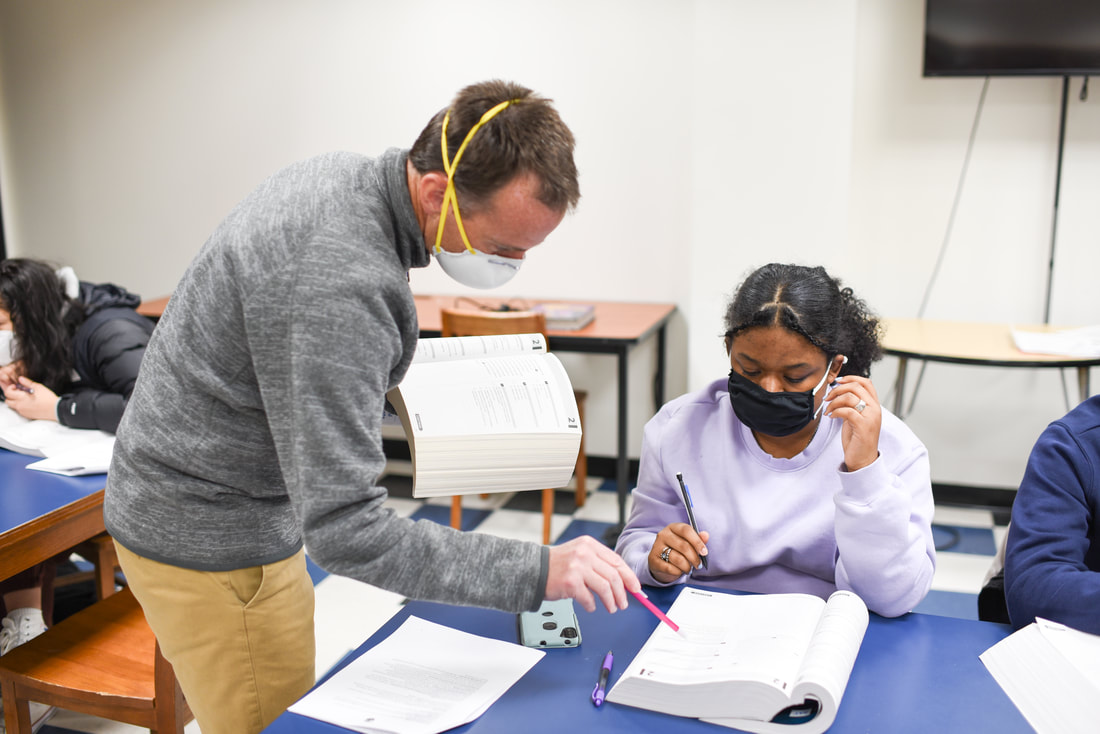 Peak Performance is back in the Bronx for Year 4 of our College Pathways Program! On a windy Friday evening in Hunts Points, ten students from seven different New York City high schools helped us kick off another year of studying, learning, and community! Two students who participated as sophomores in 2021 return as older, wiser juniors. Having already experienced the Peak approach, they will provide extra advice and guidance to the group. Lead instructor Jared Small was impressed by the variety of interests and goals cited by the students on opening night: "When I asked them to share with me their college aspirations and career goals, the responses were well-articulated and wide-ranging." For Sonia Ruiz (St. Jean Baptiste '23), the process starts with "learning strategies to work through the SAT at a faster pace so I can have time to check over my work." Fascinated by engineering, Sonia hopes to someday study at NYU or Lehigh. Her schoolmate Elizabeth Campos (St. Jean Baptiste '23) also has her eyes on some dream schools, including Syracuse and Hofstra. Intrigued by both forensic journalism and cosmetology, Elizabeth is intent on learning strategies to work faster and smarter, particularly on the reading section. Peak's trademark Active Reading techniques and emphasis on question type analysis will certainly help Elizabeth and the others sharpen their approach. As Josangel Sosa (Xavier HS '23) prepares himself for a possible career in law, he is still figuring out what type of college he aspires to attend. The one thing he is certain of is that he wants to leave the city for his college years so that he can experience a "different kind of academic experience." What's in store for Sonia, Elizabeth, Josangel, and the rest of this group? Foremost, the students will focus on mastering the SAT and getting ready to take their first or second official SAT later this year. Over the course of the next several months, our instructors and students will meet on Friday evenings in Hunts Point to dissect the 'ins' and 'outs' of the SAT. Throughout the winter and spring, the group will also gather in Westchester on Saturday mornings for timed practice exams that will help monitor progress and inform instruction. Check back in for updates of our journey together! To help you maximize your potential on the SAT and ACT exams, we encourage you to participate regularly in the proctored practice exam series that is part of your Peak Performance instructional program. To help you plan your approach to the practice testing component, I've shared some common questions and our responses below:
How Many Practice Exams Should I Take? • Each year we offer approximately 30 proctored practice exams • We find that students can reach their peak level of performance on the official exam by taking between 7-10 proctored practice exams (in addition to the diagnostics taken prior to beginning instruction). • This past year, a handful of students wound up taking 12-15 practice exams. In these instances, the decision to take so many was almost always driven by the student. For students who enjoy (or aren't bothered) by taking so many, the repetition and routine can prove immensely helpful. • For those who find the practice test component draining or less enjoyable, it's particularly important to be purposeful about which exams you take. It's crucial that when you register for a practice exam and sit down with us to take it, that you are ready to put forth your maximum effort. Performing well on a practice exam can provide a tremendous boost of confidence. How Frequently Should I Take Exams? • There is no exact formula, but here are some recommended approaches: Student begins our program 4-5 months out from first official exam date - Take initial diagnostic(s) prior to first instructional lesson - Take 1 exam in the first month - Take 2 exams per month for the next two to three months - Take 1 exam in the final few weeks leading up to first official exam - Take additional exams as needed prior to the second official exam Student begins our program 3 months out from first official exam date - Take initial diagnostic(s) prior to first instructional lesson - Take 1 exam in the first month - Take 2 exams in the second month and 3 exams in the third month - Take additional exams as needed prior to the second official exam What Type of Feedback Do I Get and How Should I Use It? • We email you a detailed score report and custom item analysis. While we promise to have this to you by 11:45pm the day after the exam, you have probably realized that in almost all cases we send this to you within about 8-10 hours of your completing the exam. • Students who benefit the most from practice exams are those who take the time to first review their results, then examine the score report and item analysis, and then take the time to work through errors and make as many self-corrections as possible How do I Register for Each Exam? • You'll continue to receive invitations from our director of testing, Helen Phillips, on Monday mornings prior to weekend exams. Please always use the provided link to register. • Please register as soon as possible upon receiving the invitation and no less than 48 hours prior to the exam as the process of determining which test to give you, printing, and potentially troubleshooting requires considerable time for us and for you. During certain times of the year, all spots fill up within about 24-36 hours of our sending the invitations. Where Can I Find the Test Schedule? • Please use these links to our SAT Testing Page and ACT Testing Page. Please note that we occasionally need to change a date and we often add dates (particularly in this given year with lots of unusual quirks in everyone's schedules). • Note that we try to offer tests on different days of the week (i.e. Fridays, Saturdays, and Sundays in the summer and weekends and holidays during the school year). • In the event that you ever wish to schedule a test on a date not offered, feel free to contact us about setting up a private practice exam. Note that the cost of a private proctored exam isn't covered in the unlimited package that you have. Guest author Rachel Z. Baumann, the newest member of the Peak team, is a Nationally Certified School Psychologist, Therapist, and Executive Functioning Coach who counsels people of all ages. Her clients include young teens and adults coping with anxiety and school/career decisions, children and teens struggling with executive functioning skills, and parents trying to help their children adjust to an ADHD diagnosis. Rachel is experienced in helping clients with anxiety, ADHD, depression, friendship challenges, learning differences, self-esteem, social skills, and relationship issues. She comes to Peak having worked with children from pre-K through grade 12 across suburban and urban settings, as well as with college-aged students and young adults. She has worked with diverse populations and is conversationally fluent in Spanish. After graduating Phi Beta Kappa from Bates College in Maine, Rachel worked in the mental health field for six years while earning her Master’s and Sixth Year Certificate in School Psychology at Fairfield University. While becoming a psychologist, Rachel also felt a pull to branch out of the schools in order to work with students and their families in a more personalized, individualized manner. She obtained her LPCA and has worked to help families manage Executive Functioning difficulties.
My Work As an Executive Functioning Coach, Therapist, and School Psychologist, I believe that nothing is more important to parents than the well-being of their child. It can be difficult to navigate the many social, emotional, physical, and cognitive changes that children experience. As a psychologist, I conduct comprehensive psycho-educational evaluations and design programs to help your child improve a wide range of skills. I also provide parent consultation to help parents understand their child’s Individualized Education Plan (IEP) and become more effective advocates for their child both in and out of school. What is Executive Functioning? The term comes from the neuroscience literature to describe the skills our brains use to execute tasks and solve problems effectively. By the time your child is a teenager, they will need to use these skills on a daily basis in order to fully cope with everyday tasks. Research demonstrates that most individuals have executive functioning skills that are strengths as well as executive functioning skills that are weaknesses. We ALL will need these skills and if your child does not know how to organize their assignments, this will inevitably affect them later in life. It does not mean that your child is any less intelligent than the child who can organize their assignments; it simply means that your child has not yet learned an effective system that works for them. Executive functioning coaching consists of identifying these areas of weaknesses and challenges so that we are better able to implement interventions to manage your child’s difficulties. If you are still wondering about the specifics behind all of these brain-based skills, here is a condensed overview: • Response Inhibition: the ability to think before you act. Is your child able to resist the urge to say something, or do they interrupt? Do they often act without thinking about the consequences? • Working Memory: the ability to hold information in memory while performing complex tasks. Does your child have difficulty remembering where they put their belongings? Do they lose things like sports equipment, their lunch money, or their phone? • Emotional Control: the ability to manage emotions to achieve goals, complete tasks, or control behavior. Does your child have difficulty regulating their emotions? Do they become easily frustrated when things don’t go their way? • Flexibility: the ability to amend plans; adapting to changing conditions. Is your child able to adjust easily to a change in plans? • Sustained attention: the ability to pay attention to a situation or task in spite of distractibility, fatigue, or boredom. Do you need to consistently remind your child to finish their homework, or can they manage on their own? • Task initiation: the ability to begin projects in a timely manner and without unnecessary procrastination. Does your child have difficulty pulling themselves away from TikTok or FaceTiming with friends? Are they able to prioritize their work properly so they have time for both work and friends? • Planning/prioritizing: the ability to create a plan to achieve your goals/complete a task. The ability to make decisions about what is important to concentrate on. Does your child know how to take the steps necessary to save money for something they really want? Do they know how to start and follow through on a project? • Organization: the ability to set up and stick with systems to keep track of information or materials. Does your child know how to find all of their assignments on Google Drive? Are assignments organized or are they all over their computer? Does your child have a system of organizing what to bring to school and what they need in order to get through the day? • Time management: the ability to estimate how much time you have, how to utilize it, and how to meet deadlines. Does your child turn their assignments in on time? Do they know how to estimate how much time it will take for them to get ready for soccer or drama practice? Do you find that you are always running to the car because they said they needed 5 minutes when they really needed 20 minutes to get ready? • Goal-directed persistence: the ability to have a goal and to follow through to achieve it. Is your child able to set things aside that they would prefer to do in order to achieve their goals? • Metacognition: thinking about thinking. The ability to stand back and to observe how you solve problems and how you reflect on your actions and thoughts. Does your child have the self-awareness to know how others are responding to their behavior, ideas, or actions? Are they good at accepting feedback from others? What does EF Coaching look like? You may be thinking that if your child has EF difficulties that they have ADHD. This is not always the case! We all have strengths and weaknesses in these areas. The good news is that all of this can be worked on and improved in order for your child to meet their academic goals and to live a more organized life. It is incredible to see the change that can occur when we are taught the skills that don’t come naturally to us. EF coaching has the ability to improve both the academic and social-emotional life of your child and your family. My aim is to help your child individually in order to meet their needs. I start by talking with the parent/guardian in order to assess the problems from the parent’s perspective. Each session is tailored and individualized to your child’s unique needs. Because we all have deeply ingrained habits surrounding EF skills, this is not a quick fix. That being said, with full and open communication, I endeavor to meet your child where they are and to develop an individualized system that will allow them to flourish. Yesterday, the College Board announced two changes that had been on the horizon for a while. First, Subject Tests have been discontinued, effective immediately. Second, as of June 5, the optional essay portion of the exam will cease to exist.
To understand the impact of this announcement on high school students, let's consider the genesis of these changes. Subject tests, formerly known as SAT II tests, had already become far less relevant than they once were. Even prior to the pandemic, fewer colleges and universities required--or even recommended--that candidates take these one-hour exams. While Subject Tests allowed students to showcase their expertise in high-level academic disciplines like Chemistry, Biology, Math II, and a host of other subjects, they suffered from two major problems. First, they consisted solely of content-based, multiple choice questions. In an educational climate that increasingly values analytical thinking and problem solving, Subject Tests fell short when it came to assessing critical thinking skills. Second, Subject Tests were redundant. AP exams, which are typically three hours and feature a mixture of question types aimed at determining a student's understanding of robust curricula, have become the coin of the realm. The disappearance of the optional SAT essay should help unmuddy the waters for students who in previous years would have struggled to decide whether to write the essay. Even prior to the pandemic, only a handful of colleges and universities were requiring or recommending the essay. As a result, fewer and fewer students were opting to spend an additional 50 minutes writing an essay that most admissions offices were not interested in reading. Additionally, the optional essay always carried with it another burden: it just wasn't very realistic. Few of us must produce timed, hand-written writing samples as a meaningful part of our professional lives. Many of us, however, do need to be able to brainstorm, draft an essay or memo, revise, and share the finished product. These are the skills that the college admissions essay requires. While the traditional college admissions essay and the shorter supplemental essays are not free of controversy, they offer a more "real world" way for students to demonstrate their writing skills and articulate their passions and life experiences. Most who follow these matters closely suspect that the optional ACT essay (the "Writing" portion) will be the next to go. Like the SAT essay, it does not impact the actual test score and has not captured the hearts or minds of college admissions folks. While it is difficult to offer a blanket recommendation for all ACT students, we are going to double down on the advice we had already been giving for the past year or two: unless you have a compelling reason to write the essay, do not bother! As students assess how to prioritize their time and energy, and as parents evaluate how to best support their children and prioritize their resources, we have a few final recommendations. First, prioritize your school work. If you take AP classes, your effort and performance on the May exams matter more than ever. Second, re-double your effort on the SAT or ACT. A leaner menu of admissions exams likely means that the SAT and ACT will take on heightened significance. Since many colleges have implemented test optional policies, a strong score has the potential to carry even more weight. Finally, continue to enrich your lives with projects, activities, jobs, sports, community service, music, and fun. If you follow your passions now, you may just enjoy the process of writing some college essays in a year or two! As always, reach out to Peak Performance with any questions. We are here to support you!  Peak Enrichment Pods Learn Content, Build Skills, and Enhance Confidence REGISTER HERE As our students prepare to return to school, we are confident that most will return to teachers who are eager to tackle the challenges of our present times and schools that are increasingly prepared for the hiccups that come with delivering remote or hybrid learning on a large scale. In order to help students bridge content and skill gaps that have arisen this past spring and will inevitably arise this fall in even the most comprehensive hybrid learning model, we are excited to announce the launch of Peak Performance Enrichment Pods. Each of our nearly 30 Pods will be geared towards a specific high school, middle school, or elementary school course. Our teachers include Peak Associate tutors and top-performing public or private school teachers who specialize in their specific courses. Most pods will meet one hour per week and will be conducted in virtual synchronous fashion (live taught via Zoom). We also welcome requests to work with self-selected Pods, either online or in-person. As with our other Peak offerings, Pods will be limited to a maximum of 8 students in order to promote student engagement, discussion, and interaction. Using the online teaching model that enabled more than 95% of our AP review students to achieve 4’s and 5’s on their spring 2020 exams, our teachers will help your child develop a deeper content base, more robust skill set, and enhanced sense of confidence in the learning process. Because our Pod sizes are small and our teachers all have full-time commitments to teaching their specific courses, we anticipate that our limited spots will fill quickly. To register, please use our Peak Enrichment Pods registration link. Additional details are below: Course Pods Currently Available for High School • Social Studies: Global History 9, Global History 10, AP World History, United States History 11, AP United States History • Math: Pre-Algebra, Algebra, Geometry, Trigonometry, Pre-Calculus, Calculus • Spanish: all levels through AP • English: AP Lang, AP Lit, Enrichment Electives including Rhetoric & Argument, Reading & Writing: Style and Argument, and Entering the Conversation: Writing with Templates • Science: Chemistry, AP Chemistry, Living Environment, AP Biology, Physics, AP Physics 1/2 Course Pods Currently Available for Elementary and Middle School • Reading Skills: 3rd/4th Grade Reading Workshop, 5th/6th Grade Reading Workshop, 7th/8th Grade Reading Workshop • Math: all levels through 8th grade • Writing Workshop: 3rd/4th Grade Writing Workshop, 5th/6th Grade Writing Workshop, 7th/8th Grade Writing Workshop • Spanish: all levels through 8th grade Cost • $75 - $150 per hour depending on course, teacher, and number of students who register • Most Pods will meet once per week for one hour. • Initial registration commitment is for 10 weeks, spanning the first quarter of the academic year from September 8 to November 13. Teachers • We have handpicked our most trusted and high-performing colleagues from Scarsdale, Byram Hills, Rye Country Day, Brunswick, and other local schools. REGISTER HERE Peak Performance is back in the Bronx! Tonight, 26 high school sophomores and juniors from 11 different New York City high schools helped us kick off the second year of our College Pathways Program.
Six students who participated as sophomores in 2018-2019 return as older, wiser juniors. With well-earned confidence, these College Pathway veterans helped guide nine new juniors and 11 sophomores through their paces on opening night. Geo Benitez (Regis '21) offered some sage advice to all: "be patient, embrace the process, and expect that your hard work will pay off over time." Melanie Mena (Ursuline '21) spoke glowingly about the skills and strategies that she had learned in Year One. Referencing Peak's trademark Active Reading techniques and emphasis on question type analysis, Melanie assured her peers that "these strategies are really helpful and make you a lot better at these kind of tests." What's in store for this group of 26 students? Foremost, the students will focus on mastering the SAT and get ready to take their first or second official SAT later this year. Over the course of the next several months, our instructors and students will meet on Wednesday evenings in Hunts Point to dissect the 'ins' and 'outs' of the SAT. Throughout the winter and spring, the group will also gather in Westchester on Saturday mornings for timed practice exams that will help monitor progress and inform instruction. For all involved, the road ahead is an exciting one. It will certainly produce countless learning moments and memories for both teachers and students! Please check back for updates, student accounts, and other news from the Bronx! |
|
|
A Blog from our Co-Founder, Jared Small
|
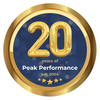
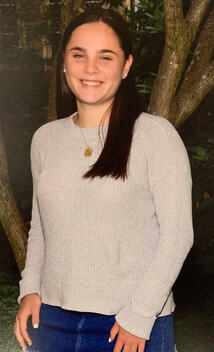

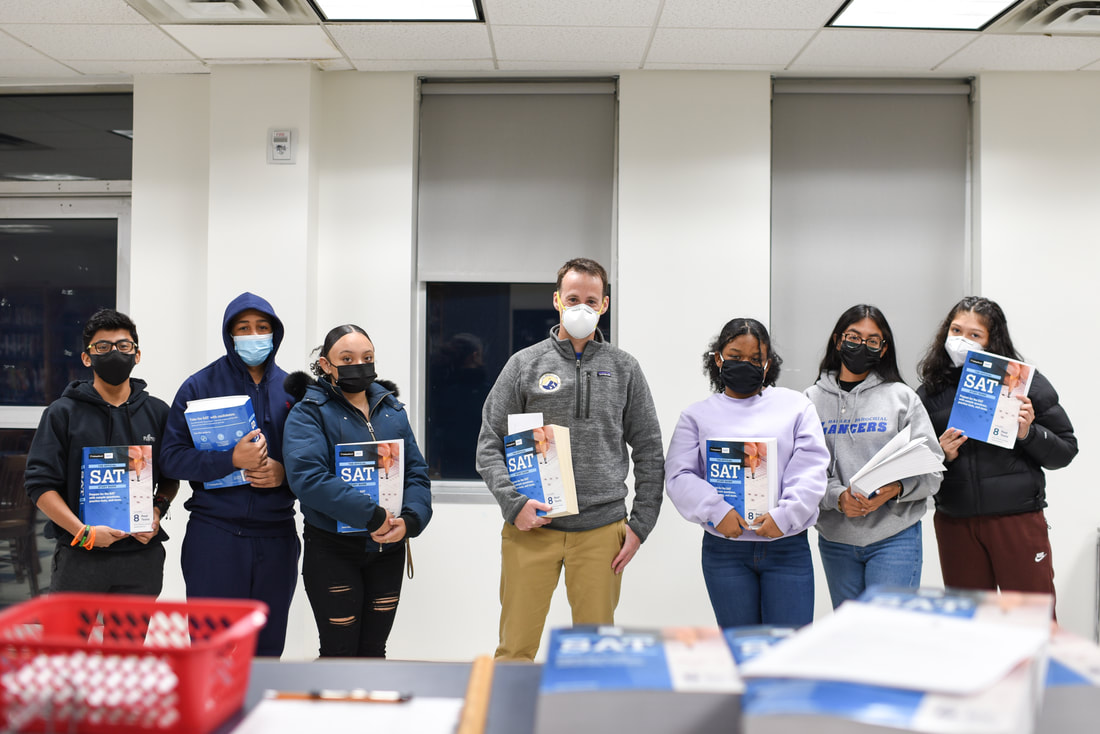



 RSS Feed
RSS Feed